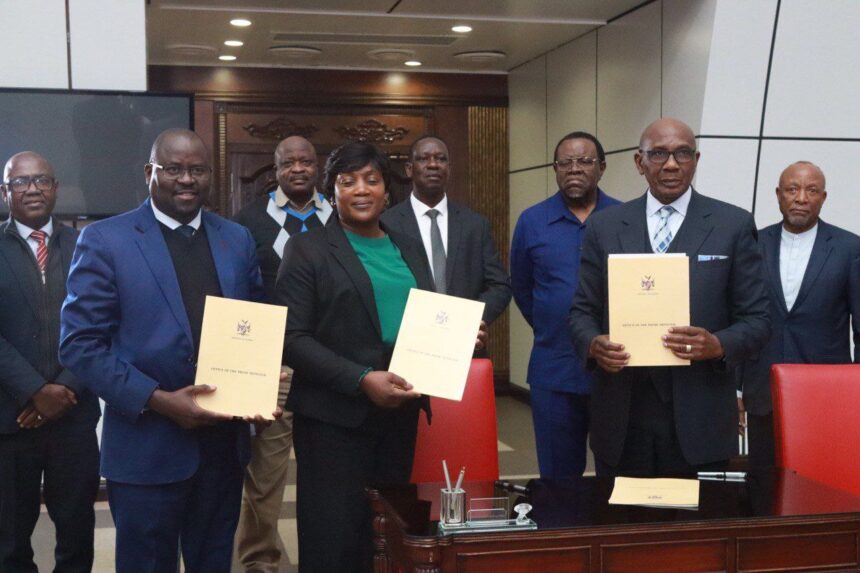Two unions, the Namibia National Teachers Union and Namibia Public Workers Union, proposed salary and other benefit increases for civil servants for the 2023/24 and 2024/25 financial years.
Dated 20 February 2023 and addressed to the Prime Minister, the unions stated the submission to government was done with due consideration of current economic indicators in the country, including government’s financial position and obligations.
Currently, Namibia has about 107 000 public servants, inclusive of the security cluster.
The government’s total expenditure on public servants stands at about N$30 billion, which is over 42% of the total budget.
For the 2023/24 FY, unions are proposing a salary increase of 8% across the board, while on housing subsidies, they propose an increase of the qualifying amounts.
Specifically, the unions are asking for housing allowance for management cadres to be increased by 8% and for those below management level to be increased by 20%.
The labour representatives are also asking for transportation tariffs to be increased to N$7 per kilometre and for an increase in transport allowances for positions below management to go up by 20%.
For the 2024/25 FY, the unions propose a salary increase of 10% across the board, while on the provision of housing, they propose government conducts a comparative study on the provision of housing by governments in the Southern African Development Community (SADC).
The purpose of the proposed study is to provide civil servants with the best alternative to the current housing provisions by the local government.
“On medical aid, government should conduct a comparative study on the provision of medical aid and facilities by governments in the SADC region with the purpose to curb cost and provide the best alternative to the current medical aid provision to civil servants by the government,” reads the report addressed to Prime Minister Saara Kuugongelwa-Amadhila.
In the proposal, the unions also urged to include the possible improvement of the national health facilities and the procurement of advanced medical equipment countrywide as part of cost-cutting measures and improvement of the provision of general public health services to all citizens.
However, President Hage Geingob recently told the Public Service Commission that the size of the country’s civil service is too big and not sustainable.
Meanwhile, the Public Service Medical Aid Scheme (PSEMAS) was allocated an amount of N$2.7 billion during the tabling of the recent national budget.
However, the Trade Union Congress of Namibia (Tucna) secretary general Mahongora Kavihuha questioned the timing of the proposal. According to him, this is a joke from the two unions.
“The timeframe is not realistic from the unions. How can you submit the proposal two days before the budget tabling? But salary increments for civil servants are long overdue and not the humiliating 3% that government offered [last year],” said Kavihuha.
He also hopes the unions are serious and do not betray workers’ futures or exercise to make them look good.
Local economist Salomo Hei said both parties have to play a balancing act and face the reality. According to him, the 3% increment of last year was below the inflation rate.
“The economy is in a special environment where inflation is driven by the supply side. Unions should be cognizant the second round of inflation should be expected, which will be induced by demand this time,” he stressed.
Hei said it cannot be argued that the standard of living has increased, and many lost their jobs due to the economy that was not responding well.
“This is now a cat-and-mouse situation. It is either an increase now and lose your job in a few months or no increase and have the job,” said the economist.
For 2023, economic growth is projected to moderate to 3.2%, reflecting revised mining production estimates before slowing further to 2.2% in 2024.
In this regard, growth is expected to be anchored by activities in the mining sector and tertiary industries as well as recovery in most sectors of the secondary industries.
In August last year, government averted a potentially crippling strike by reaching a compromise agreement, which Cabinet secretary George Simataa pronounced as “peace over money”.
“The N$924 million that you might get now would be in billions to repair what people would have lost [through the strike],” he said.
Government increased its offer from the initial N$334 million to over N$924 million, meaning a 3% basic salary across the board, housing allowance for civil servants below management by 11% and transport allowance by 14%.
President Hage Geingob, who suspended an official international trip to help broker the deal, commended the negotiating parties for finding a common ground.
Photo: Civil
Caption:



